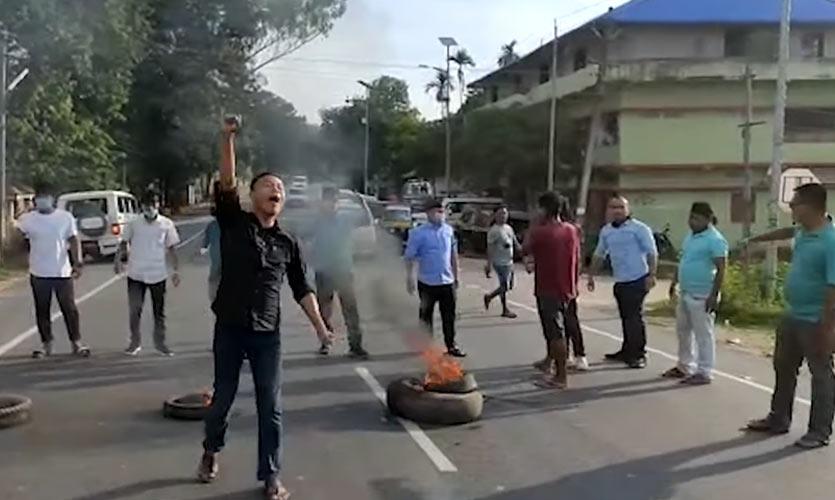On the same day as the Karbi Peace Accord was signed in New Delhi, various social organisations protested the agreement that stipulates the inclusion of 10 seats in the Karbi Anglong Autonomous Council (KAAC), now open to all communities in the state. More than 24 social organisations took part in a protest rally along the Diphu-Manja road outside the office of the BJP-East Karbi Anglong District Council (EKADC).
According to the Eastern Mirror Nagaland, they set fire to tyres and shouted slogans. The road was cleared once the police reached the spot. Ratan Terang of the United Karbi Students Association said, “We have opposed the peace accord as the peace accord is against the Sixth Schedule.” They plan to oppose the bill democratically in the coming days. The convener of the 24 social organisations, Litsong Rongphar, stated that the provision for seat reservation has already been implemented in the KAAC.
The organisations are urging the implementation of paragraph two subparagraph seven of the Sixth Schedule in the constitution of India, which states that new rules should be made by the council with the approval of the governor. One of the members of the organisations and President of Karbi Farmers Association, Avinush Ronghang said, “Though we welcome the peace accord, on one side it is a black day for us as the peace accord mentioned that out of 44 elected seats in KAAC, 34 seats are reserved for ST communities and the other 10 seats are open for all communities. The 10 seats open for all means throwing the door open for the general communities to get elected to KAAC and dominance over the ST communities.”
“The insertion of this particular point is unacceptable to us and we are prepared to protest through democratic means. If required we will approach the Gauhati High Court,” Ronghang stated. Protesting organisations argued that the reservation of seats in the KAAC was not rational, and that all the seats should be reserved for the tribals.
Apart from the seat dispute, the organisation has also demanded, in accordance with Article-244 (A) of the constitution, that the hill district be declared an “autonomous state”. According to Abinash Ronghang, another convener of the 24-organisation forum, Article-244 (A) has not been discussed in the agreement. Two decades have passed since the need for an autonomous state was first raised. However, it is only now that it has taken the form of a mass movement led by students.
Protesters have pointed out that they are requesting no more than the implementation of a constitutional provision. After Independence, according to India Today, Karbi Anglong and North Cachar, with a total population of 7.21 lakhs, were given autonomy to ensure that tribals who make up 85 percent of the population retain their identity. Upon the statehood of neighbouring Meghalaya in 1971, residents of the two districts were asked whether they wished to be part of Meghalaya or remain as they were. They stayed with Assam after the state leadership assured them that greater independence would come their way.
The agitators claim that the area has been neglected by the government and that the tribals are largely being excluded from mainstream life in Assam. According to their demands, Article 244 (A) of the Constitution – introduced in 1969 – provides for the formation of two autonomous states in the two districts.
Furthermore, the “imposition” of Assamese in schools and colleges is resented by tribals who prefer English. According to former chief minister, Prafulla Mahanta, the demand for an autonomous state is the first step toward statehood. Money is not an issue for the development of Karbi Anglong. The state received ₹40 crores in 1986-87, of which ₹37 crores came from the Centre and the rest from the state government. Many of these resources have been wasted. In the past, this money has allegedly been gobbled up by Karbi Anglong’s district council, which is headed by a chairman. District council members are said to have worked hand in hand with Guwahati’s bureaucrats.
Read more: Karbi Anglong Peace Accord Marks The Dawn Of A New Era, Will Rehabilitate 1000 Militants
According to student leaders, simply pumping in money that goes into a few hands won’t solve the problem. In their view, only an autonomous state can engender the kind of political culture that will genuinely oversee tribal interests.
Unwilling to be left out, the local Congress has also demanded autonomy and convinced the Minister of State for Home, Chintamani Panigrahi, to visit Diphu last fortnight to ostensibly examine the subject. The governing Asom Gana Parishad has protested, claiming that it would embolden the insurgents. The Karbi Students Association and Autonomous State Demand Committee, on the other hand, have called for a bandh in Diphu on the day of Panigrahi’s arrival.
The hill areas are destined to become another political battleground as competing factions continue vying for autonomy.










